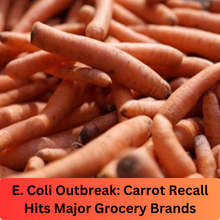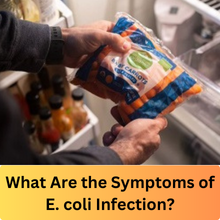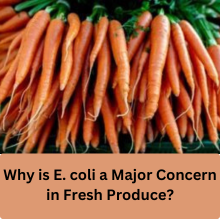
In November 2024, a widespread E. coli outbreak linked to bagged organic baby and whole carrots sold at major grocery stores like Trader Joe’s, Whole Foods, and Target prompted a recall by Grimmway Farms. This recall impacted dozens of consumers across 18 U.S. states and Canada, with 39 reported illnesses, 15 hospitalizations, and one fatality. The recall included a variety of carrot products, including those under well-known brands like 365, Bunny Luv, and Good & Gather. Although these carrots have been pulled from store shelves, they may still be in consumers’ homes, making it crucial to check your fridge and freezer.
In this article, we’ll break down the details of the recall, the affected brands, the symptoms of E. coli infection, and what steps consumers should take to protect their health.
The E. coli Outbreak and Its Scope
E. coli is a dangerous bacterium that can lead to serious gastrointestinal issues and even more severe health complications. This particular strain, known as Shiga toxin-producing E. coli, can cause symptoms like severe stomach cramps, diarrhea (often bloody), vomiting, and fever. In this case, the outbreak was linked to organic carrots, affecting people in several states, including Washington, California, Texas, and Minnesota.
The CDC has confirmed that 39 people were sickened, with 15 requiring hospitalization and one death reported in California. Although the outbreak affected 18 states, the CDC warns that the true number of people affected could be much higher due to unreported cases.
Affected Brands and Products
Several brands of organic carrots were involved in the recall, and these products were sold in popular grocery stores nationwide, including:
- Trader Joe’s
- Whole Foods
- Target
- Wegmans
- Sprouts
- Simple Truth
- Good & Gather
The recall affected both organic whole carrots and organic baby carrots, with best-if-used-by dates ranging from September 11, 2024, to November 12, 2024. Some whole carrots, which didn’t have a printed best-if-used-by date, were sold between August 14 and October 23, 2024. These carrots were shipped across the U.S., Puerto Rico, and Canada, meaning anyone who purchased these carrots during the specified period should check their homes immediately.
What Caused the Recall?
The root cause of the recall is contamination with Shiga toxin-producing E. coli, which can cause severe gastrointestinal issues. The E. coli bacteria likely contaminated the carrots during the harvesting or packing process. While the carrots were handled and packaged by Grimmway Farms, the contamination could have occurred at any point along the food supply chain. This is a reminder of the vulnerability of fresh produce to bacterial contamination, even when it is organic.
What Are the Symptoms of E. coli Infection?
E. coli infections can range from mild to severe. Symptoms typically begin 3-4 days after exposure and include:
- Severe stomach cramps
- Diarrhea (often bloody)
- Vomiting
- Fever
In some cases, the infection can cause kidney failure, especially in children, elderly individuals, and those with weakened immune systems. If you experience these symptoms, it is crucial to seek medical attention right away.
How Long After Exposure Do Symptoms Appear?
E. coli symptoms usually appear between 1 to 10 days after eating contaminated food. It’s essential to stay alert to the onset of symptoms and seek medical help if necessary. The sooner you receive treatment, the better the chances of avoiding severe complications.
What Should Consumers Do?
If you purchased any recalled carrots, the CDC recommends the following steps:
- Do not eat the recalled carrots.
- Destroy or discard them so they cannot be consumed.
- Clean and sanitize any surfaces, containers, or utensils that may have come into contact with the recalled carrots.
Even if you no longer have these carrots in your home, it’s a good idea to check your refrigerator or freezer to ensure that none of the recalled products are still on hand.
How to Check if You Have Recalled Products at Home?
To check if your carrots are part of the recall, look for the following:
- Brand names like 365, Bunny Luv, Cal-Organic, and Trader Joe’s.
- Best-if-used-by dates (for baby carrots) between September 11, 2024, and November 12, 2024.
- Packaging details (for whole carrots) sold between August 14 and October 23, 2024, without a printed best-if-used-by date.
If you find any recalled products, discard them immediately and follow the CDC’s guidelines for sanitizing your kitchen.
The FDA’s Response to the Outbreak
The FDA acted swiftly to coordinate the recall and provide detailed guidelines to consumers. The agency’s primary concern is consumer safety, and they have worked closely with Grimmway Farms and health authorities to ensure that contaminated products are no longer available for sale. They also stressed the importance of thorough cleaning of surfaces and utensils that may have come into contact with the carrots.
E. coli outbreaks aren’t new, and there have been several significant foodborne illness incidents in recent months. For example, in October 2024, over 100 people were sickened by an E. coli outbreak linked to slivered onions sold at McDonald’s. Similarly, in the UK, an E. coli outbreak in June 2024, linked to contaminated lettuce, sickened 275 people, with one fatality.
While the frequency of these outbreaks is concerning, health experts still maintain that the overall food supply remains safe. However, more must be done to address the root causes of contamination, especially in fresh produce.
Why is E. coli a Major Concern in Fresh Produce?
Fresh produce like carrots can become contaminated with E. coli through direct contact with water or soil that’s tainted with the bacteria. Since produce is often consumed raw, it doesn’t undergo a cooking process that could kill harmful bacteria. This makes it especially important for growers and suppliers to implement rigorous food safety practices to prevent contamination.
What Steps Are Being Taken to Prevent Future Outbreaks?
The food industry is continuously working on improving safety standards. New technologies are being explored to detect and eliminate harmful bacteria in fresh produce. Additionally, there’s a growing focus on educating consumers about proper food handling practices, including washing and sanitizing fruits and vegetables before eating them.
Public Health Officials’ Guidance for Affected States
Health authorities in the affected states have been proactive in investigating the source of the outbreak and issuing alerts to the public. Residents are encouraged to follow guidelines from the CDC and FDA, report any symptoms, and seek medical care if they have consumed the recalled products.
Impact on Consumer Confidence in Organic Produce
This recall raises concerns about the safety of organic produce, which is often seen as a healthier alternative to conventionally grown food. Although the contamination occurred in organic carrots, it doesn’t mean that organic produce is inherently unsafe. It simply highlights the need for stronger safety measures throughout the entire food production process.
Also read: Experience Bhutan’s Spiritual Secrets and Ancient Festivals
Conclusion
The recall of organic carrots due to E. coli contamination serves as a stark reminder of the importance of food safety. If you have any of the recalled products in your home, it’s crucial to dispose of them immediately and sanitize any surfaces they may have come into contact with. Stay informed about food recalls and take steps to protect your health and the health of your family.
FAQs
-
What should I do if I have recalled carrots at home?
- Discard the recalled carrots immediately and clean any surfaces they may have touched.
-
How can I tell if my carrots are part of the recall?
- Check for the recalled brand names and best-if-used-by dates listed above.
-
What are the signs of an E. coli infection?
- Look for symptoms like stomach cramps, diarrhea (which may be bloody), vomiting, and fever.
-
Are organic carrots safer than conventional ones?
- While organic carrots are often considered healthier, they can still become contaminated with harmful bacteria.
-
How can I prevent E. coli infection from produce?
- Wash all fruits and vegetables thoroughly, and make sure to practice proper food handling and hygiene.

